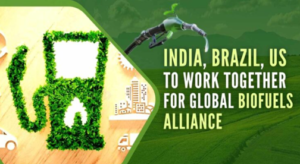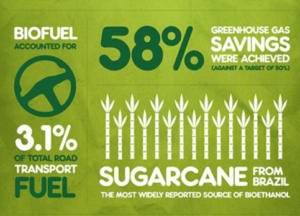Clean Aviation Requires Beyond Biofuels.
Relevance
- GS 3: Conservation, Environmental Pollution and Degradation, Environmental Impact Assessment.
- Tags: #CarbonNeutrality #Biofuels #CleanAirTravel #DecarbonizeAviation #BioWaste #CarbonCapture #AviationIndustry #FutureOfTravel #MintEditorial #UPSC.
Why in the news?
Union Minister Hardeep Singh Puri envisions India becoming a major Sustainable Aviation Fuel (SAF) producer, aiming to combat aviation’s carbon emissions, but challenges lie ahead.
India’s Ambition in Sustainable Aviation Fuel (SAF)
- Union Minister Hardeep Singh Puri highlights the potential of the Global Biofuel Alliance (GBA) in making India a major SAF producer and exporter.
Challenges in Aviation Emissions
- SAF, with the promise of reducing aviation emissions by up to 80%, offers hope in tackling the industry’s carbon footprint
- Aviation contributes 2% of global carbon emissions due to jet engines burning fossil fuels.
- Without decarbonization, this share is expected to increase rapidly.
Electric Planes Remain a Challenge
- Large electric planes face technological hurdles due to the need for lightweight batteries.
- Take-offs require significant thrust, making electric power alone insufficient.
- Breakthroughs needed before electric planes become a viable option for large-scale air travel.
SAFs and Carbon Capture as Solutions
- Sustainable aviation fuels (SAFs), along with carbon capture, offer the best path to carbon neutrality.
- The GBA aims to accelerate the transition to SAFs.
Challenges on the SAF Path to Carbon Neutrality
SAF Supply Capacity
- SAF production requires significant quantities of agricultural resources, mainly crops like sugarcane and corn, which are on the rise globally.
- However, diverting these resources from food production to biofuel can lead to output limitations.
Diversifying Feedstock
- India’s SAF strategy aims to utilize various types of biomass, including bio-waste like used cooking oil, forest residue, agricultural waste, and municipal refuse.
- This diversification helps reduce the strain on food crops.
Gradual Adoption of SAFs
- Initially, a small percentage of biofuel (e.g., 1%) will be blended with conventional jet fuel.
- The bio-content will increase gradually as aircraft adapted for SAF become more prevalent.
Domestic SAF Potential
- Union Minister Hardeep Singh Puri suggests that even if India reaches a 50% biofuel blend by 2030, domestic production capacity could exceed demand.
Current Global SAF Consumption
- Globally, SAFs account for a mere 0.1% of aviation fuel consumption due to their complex production process.
- SAFs are more expensive than traditional jet fuel and have lower energy density, necessitating larger volumes for refueling.
Significant Challenges Ahead
- The SAF-led path to carbon neutrality faces hurdles, including feedstock availability, cost, and production complexity.
- Achieving substantial adoption of SAFs in aviation requires overcoming these challenges, especially in making them cost-competitive and readily available.
Regulatory Push for SAF Adoption
SAF conversion requires strong regulatory support, and global efforts are underway through the UN’s Carbon Offsetting and Reduction Scheme for International Aviation.
- Compliance Deadline for Indian Airlines – Indian airlines operating foreign flights will need to adhere to international carbon offset norms within the next 5 years.
- Initial SAF Implementation in India – India took a small step towards SAF adoption with a Pune-Delhi AIX Connect flight using a 1% SAF blend produced locally.
- Indian air carriers will be encouraged to use SAFs as their availability increases.
Challenges and Uncertainty in SAF Adoption
- The true effectiveness of SAFs in reducing emissions, even by the claimed 80%, is a subject of skepticism, especially in the absence of extensive records and rigorous scrutiny.
- SAF adoption’s impact on aviation’s environmental footprint may take many years to become evident.
While regulations and initial efforts are promoting SAF adoption in Indian aviation, the true impact of SAFs on emissions reduction remains uncertain and will require time, market developments, and rigorous assessment to become clear. Innovations in aircraft technology may also be a crucial aspect of achieving cleaner aviation in the long term.
| Global Biofuel Alliance (GBA)
· On September 9, 2023, Prime Minister Shri Narendra Modi, in his role as the G20 Chair, led the launch of the Global Biofuel Alliance (GBA). · This initiative was joined by leaders from several countries, including Singapore, Bangladesh, Italy, USA, Brazil, Argentina, Mauritius, and the UAE. · The launch occurred during the G20 Summit in New Delhi. Objective · The GBA is an ambitious project aimed at accelerating the global adoption of biofuels. · It seeks to achieve this by promoting technological advancements, increasing the use of sustainable biofuels, establishing robust standards and certifications, and involving a diverse group of stakeholders. Knowledge Hub · The alliance will also serve as a central repository of knowledge and an expert hub, facilitating the sharing of information and expertise in the field of biofuels. Catalytic Platform · GBA’s primary role is to catalyze global collaboration to advance and widely implement biofuels as an eco-friendly alternative to traditional fuels. Global Sustainability · By involving multiple countries and leaders, the GBA aims to contribute to global efforts to combat climate change and reduce carbon emissions through the adoption of biofuels. |
Source: Mint
Mains Question
What are the challenges associated with the widespread adoption of sustainable aviation fuels (SAFs) in the aviation industry, and how does the Indian government plan to address these challenge.





